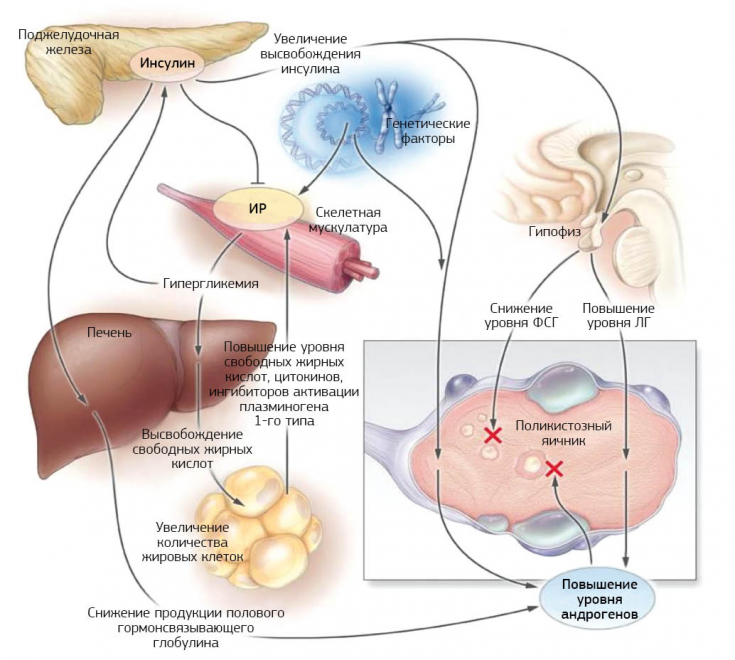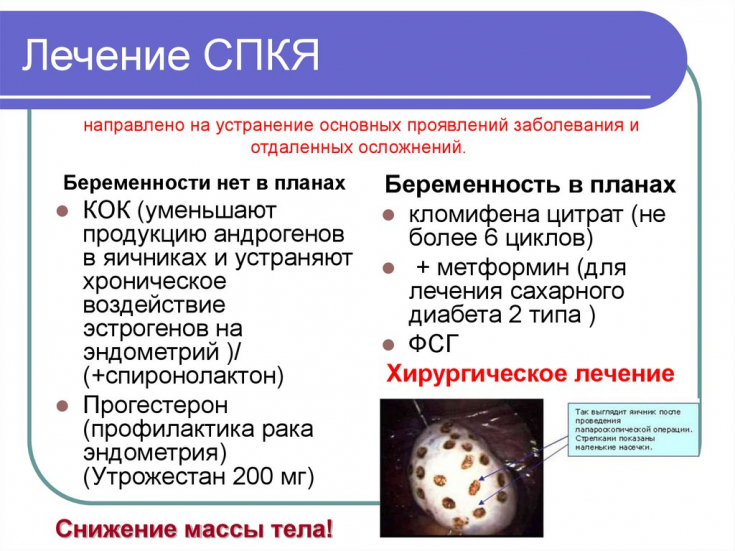Polycystic ovary syndrome (PCOS) is characterized by infrequent or absent ovulation and high levels of androgens and insulin (hyperinsulinemia).
Hyperinsulinemia occurs secondary to insulin resistance and is associated with an increased risk of cardiovascular disease and diabetes. Insulin sensitizing agents such as metformin may be effective in the treatment of PCOS-associated anovulation.
In the article estet-portal.com you can read in detail the evaluation of the efficacy and safety of insulin sensitizing drugs to improve reproductive and metabolic indicators in women with PCOS during ovulation induction.
Evidence base for the treatment of polycystic ovary syndrome
The authors analyzed the following databases from inception to January 2017: Cochrane Gynecology and Fertility Specialized Registry, CENTRAL, MEDLINE, Embase, PsycINFO and CINAHL.
Randomized controlled trials of insulin sensitizers versus placebo, no treatment, or an ovulation-inducing agent were included in women with oligo- and anovulatory PCOS.
Follow us on Instagram
Metformin, clomiphene citrate, metformin plus clomiphene citrate was evaluated. The authors included 48 studies (4451 women). The quality of the evidence ranged from very low to moderate.
Metformin versus placebo or no treatment
Evidence suggests that metformin may improve fertility compared to placebo (4 studies, 435 women, low-quality evidence).

The metformin group experienced more gastrointestinal side effects (7 studies, 670 women, moderate-quality evidence), but had higher rates of clinical pregnancy (9 studies, 1027 women, moderate-quality evidence), ovulation (14 studies, 701 women , moderate-quality evidence) and menstrual frequency (7 studies, 427 women, low-quality evidence). There was no clear evidence of a difference in miscarriage rates (4 studies, 748 women, low-quality evidence).
The most important information about PCOS
Metformin plus clomiphene citrate vs clomiphene citrate alone
There was no strong evidence of a difference between groups in fertility rates (9 studies, 1079 women, low-quality evidence), but gastrointestinal side effects were more common in the combination group (3 studies, 591 women, moderate-quality evidence).
However, there were higher rates of clinical pregnancy (16 studies, 1529 women, moderate-quality evidence) and ovulation (21 studies, 1624 women, moderate-quality evidence) in the combination group.
Metformin versus clomiphene citrate for polycystic testicular syndrome
When all studies were pooled, data on live births were inconclusive and inconsistent (5 studies, 741 women, very low-quality evidence).

The updated review suggests that metformin alone may be effective compared to placebo in terms of live birth, although the quality of the evidence was low. Among obese women taking metformin, there were lower rates of fertility, clinical pregnancy and ovulation. There was no clear evidence of a difference in miscarriage rates (5 studies, 741 women, very low quality evidence).
The results differed in body mass index, emphasizing the importance of this parameter.
The increase in clinical pregnancy and ovulation suggests that clomiphene citrate remains preferred over metformin for ovulation induction in obese women with PCOS.
The increase in clinical pregnancy and ovulation with metformin and clomiphene citrate compared with clomiphene citrate alone suggests that combination therapy may be more effective. Women taking metformin alone or in combination with another drug should be warned that gastrointestinal side effects are more likely.
Thank you for staying with estet-portal.com. Read other interesting articles in the "Gynecology" section. You may be interested in How obesity affects the development of polycystic ovary syndrome







Add a comment